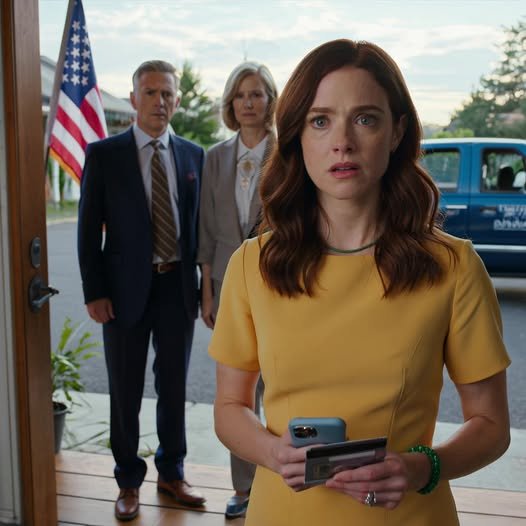At 8:07 a.m., with gray light leaking through the blinds, I called my dad. He answered on speaker, like he always did when he was busy doing something more important than the conversation. Music blared in the background, some classic rock station turned up too high.
I could hear plates clattering, my mom’s laugh, the buzz of a TV. “Yeah?” he said. “Make it quick, kid.
We’re trying to get out the door. Your mom’s flipping pancakes for Tyler and the kids.”
Tyler. My younger brother.
The golden child with the permanently broken truck and the endless stream of “emergencies.”
“Hey, Dad,” I said, forcing my voice steady. “Something’s wrong with my account. My card is maxed.
Actually, beyond maxed. There are charges I didn’t make. Did something happen?”
There was a pause.
Not the confused kind. The calculating kind. When he finally spoke, there was no apology.
No confusion. Just annoyance. “You’re always so dramatic, Riley,” he snapped.
“The family needed help.”
The words landed like a slap. “What does that mean?” I asked. “It means,” he said, talking slower now like I was stupid, “your mom had surgery.
Your brother’s truck broke down again. The mortgage was behind. We did what we had to do.”
We.
I gripped the edge of my kitchen counter so hard my knuckles went white. “Dad, that’s my card,” I said. “My money.
My name.”
“And?” he shot back. “You make plenty. You’re always sending those cute little photos of your office view and your fancy coffee.
We’re not asking for anything you don’t owe us. This family sacrificed for you.”
There it was. Not a glitch.
Not a misunderstanding. Entitlement. “Why didn’t you ask me?” I whispered.
He scoffed. I could picture his face without seeing it: the eye roll, the impatient jaw clench. “We don’t need to ask for what you owe us,” he said.
In the background, my mother’s voice cut through, as sharp and bright as broken glass. “Is that Riley?” she called. “Put me on.”
Before I could say no, her voice filled the speaker.
“Riley,” she said, using the tone she saved for when she’d already decided I was being unreasonable. “What’s this dramatics about your little card? We had real issues down here.”
“My little card?” I repeated.
She barreled on. “Your brother needed his truck to get to work. The house needed saving.
And I had surgery, in case you forgot your own mother almost died.”
“You did not almost die,” I said, biting the inside of my cheek. “You had your gallbladder removed. Elective.
You sent me pre-op selfies with dog filters.”
She ignored that. “Besides,” she said, voice tilting smug, “what were you going to do with that money? Buy yourself cake and candles?
You can celebrate alone. We had better plans.”
There was a silence then. On their end, it was probably nothing.
On mine, it was a seismic shift. That word—alone—hung between us, dripping with the familiarity of a threat they’d been using on me my whole life. I realized, with a clarity that made my stomach flip, that they weren’t sorry.
Not even a little. “That silence right there,” I said finally, my voice calm in a way that scared even me, “that was my final birthday gift.”
“What’s that supposed to mean?” my dad barked in the background. “It means,” I said, “don’t ever call me again.”
And I hung up.
My hand shook as I set the phone down on the counter. The rain had turned into a steady drizzle. The cheap clock over my stove ticked obnoxiously loud.
I could have collapsed. I could have called a friend and sobbed. I could have driven four hours back to the house I grew up in and screamed on the front lawn.
Instead, I opened my laptop. If they thought they had lifetime access to my veins, I was about to prove I could stitch them shut. The first thing I pulled up was the mortgage.
Technically, it wasn’t my house. It was the tired single-story in the small Oregon town where I’d grown up, the one with faded siding and a porch swing that creaked like an old throat clearing. But the mortgage?
That was mine. When their credit tanked after Dad’s second DUI and Mom’s collection of payday loans finally came home to roost, the bank wouldn’t touch them. So they’d come to me.
“We just need a little help,” Dad had said at my tiny kitchen table years earlier, hat in hand, his voice soft in a way it never was unless he wanted something. “You’re the only one the bank will approve. You’re our success story, kid.”
I’d been twenty-three.
Fresh out of grad school. Working eighty-hour weeks as a junior financial analyst, wearing thrift-store blazers and clinging to free office coffee. Signing that mortgage had felt like some twisted rite of passage.
I’d believed him when he said it was temporary. I believed a lot of things back then. Now, as the login screen loaded, I stared at my name at the top of the account.
Primary account holder: Riley Green. Their address. Their roof.
My liability. My cursor hovered over the “Autopay” tab. For years, I’d let those payments quietly draft out of my account.
Every time I’d considered stopping, I’d hear Mom’s voice on a loop. “Do you want your little brother out on the street?”
“After everything we’ve done for you?”
“You know we’ll pay you back when we can.”
We both knew that last part was a lie. I clicked into the settings.
Autopay: ON. I took a breath. My heart pounded.
My palms were slick. Then I clicked “Cancel.”
A warning box popped up. Are you sure you want to disable automatic payments?
I thought about thirty-six thousand dollars evaporating without a single phone call. About my mother’s voice telling me to celebrate alone. “Yes,” I said out loud to the empty apartment.
Confirm. Next was the truck. Tyler’s lifted F-150, the one he absolutely did not need but “couldn’t be a real man without.” He’d called me two years earlier from a used car lot, voice shaking, talking about opportunities and responsibility and how this truck was his shot at providing for his kids.
The salesman had wanted a cosigner. “Please, Riley,” Mom had begged over the phone. “You know how banks are.
They just want someone with a good record on the paperwork. You’re not really paying for it. It’s just your name.”
My name.
The one thing I’d spent years cleaning, polishing, building. I logged into the lender’s site now and found the account. Riley Green – Co-signer.
Late notices. Extra fees. Payments that had “slipped his mind” and quietly drafted from my account so my credit wouldn’t take the hit.
I went into the payment settings and shut off my card. Let the system chase the actual owner. Then came my mother’s student loan.
At forty-eight, she’d decided she wanted to go back to school “to become a nurse.” Instead of community college, she’d enrolled in a glossy for-profit program with smiling students on the brochure and horror stories buried in the fine print. “They said I just need a cosigner,” she’d insisted, waving the paperwork. “We’ll pay it.
You won’t even notice.”
I’d noticed. The loan account showed months of me quietly covering missed payments, keeping it from defaulting because I couldn’t stand the thought of my name being dragged through collections. Now, my jaw tight, I clicked into “Co-signer options.”
A form popped up: Request removal due to financial duress and unauthorized use of credit.
I filled it out slowly, listing every reason in clinical language that felt cold and right. When I finished, I stared at the confirmation screen. You have submitted a request to be released as co-signer.
Submit. One by one, I moved through my digital life. The family phone plan I had added them to because “it’s cheaper this way.”
Hulu.
Netflix. Amazon Prime. The utility accounts in my name because Mom’s credit was a disaster and “they just need someone stable on file.”
Click.
Cancel. Remove authorization. With every autopay I shut off, every account I unhooked from my veins, a strange quiet spread through my chest.
It didn’t feel like guilt. It felt like turning off alarms that had been blaring for so long I’d mistaken them for background noise. By noon the next day, the consequences started knocking.
Literally. The truck got repossessed from their driveway, the tow lights flickering against peeling paint as neighbors peeked through blinds. Mom called me screaming while it was still being loaded onto the flatbed.
“How could you let them take his truck?” she shrieked. “He needs that for work. They’re babies in this house, Riley, what are you thinking?”
I held the phone away from my ear, staring at the call screen like it was a ticking bomb.
“I’m thinking,” I said finally, “that I’m not the one who signed the original loan.”
She cursed, called me selfish, ungrateful, heartless. I hung up. The mortgage company called next, their tone professional, almost apologetic.
“Ms. Green, we noticed the automatic payments have been disabled,” the rep said. “Would you like to set up a new payment method?”
“No,” I said.
A pause. “You do understand the account will be considered delinquent if no payment is received?” she asked gently. “I understand,” I replied.
“You should talk to the people living in the house.”
“Family can be… complicated,” she said, voice softening. “Yeah,” I answered. “That’s one word for it.”
By evening, my phone looked like a wildfire.
Thirty-seven missed calls. A dozen voicemails. A flood of texts that swung wildly from furious to pleading.
Riley, what did you do? The bank says the mortgage isn’t getting paid. What’s going on?
You didn’t really cancel the utilities. Say you didn’t. We’re family.
Just call us. We can fix this. Family.
Funny how that word only shows up when the lights go out. I put my phone face down on the table and opened my laptop again. I froze my credit.
Changed every password. Removed their names from every “authorized user” list like I was removing tumors. They thought, because I was the responsible one, that they had lifetime access to my veins.
That night, I became a scalpel. I didn’t start out knowing how to say no. When I was twelve, my mom sat at our kitchen table with a shut-off notice in her hand and tears streaming down her cheeks.
The house smelled like canned sauce and desperation. The red letters on the paper might as well have been a threat stamped across our front door. “I don’t know what we’re going to do,” she sobbed.
“The lights are going to get shut off, Riley. Your brother needs power for his homework. Your dad is trying.
We just can’t catch a break.”
Dad was at a bar. I stared at the amount due, then at my hands. I thought about the little salon on the corner where I stopped after school to look at the sparkly hair clips in the window.
The next day, I walked in with my backpack still on. “Can I help you?” the owner asked, eyebrows raised. “I’m twelve,” I blurted out.
“I can sweep hair and clean mirrors and take out trash. I’ll work after school for cash. You don’t even have to put me on the books.”
She blinked, then laughed softly, then looked at whatever she saw in my face and stopped laughing.
“Floor’s your kingdom,” she said. “Don’t touch the scissors.”
I swept hair until my back ached and my fingers cramped around the handle of the broom. At the end of the week, she pressed a wad of crumpled bills into my hand.
I went home and dropped them on the table in front of my mother. “Don’t let the lights get turned off again,” I said. She kissed my forehead and called me her little miracle.
That was the first time I felt responsible for my parents. It would not be the last. By fifteen, I knew which utility companies would give an extension if you cried and which ones demanded payment in full.
At seventeen, when Dad got his first DUI, it was me he called from the station. “Riley, it was a misunderstanding,” he slurred. “They’re just out to get me.
If I don’t pay this fine, I’ll lose my license. I need my truck to work. You don’t want your old man locked up over nothing, do you?”
I emptied my savings account—the money I’d been tucking away for college applications—and paid the fine.
Afterward, as he hugged me in the parking lot, he said, “Family doesn’t keep score. Remember that, kid.”
He said it right after taking everything I had. So I stopped keeping score.
But my body didn’t forget. The late nights worrying about whether they’d pay the rent. The phone calls from collections I intercepted so my brother wouldn’t hear.
The way my mom’s tears always dried up the second the bill was handled. Somewhere along the line, I stopped being their child and became their contingency plan. So when I left for college on a scholarship and landed that first corporate job with a real salary and benefits and a view of downtown Portland through floor-to-ceiling windows, I’d thought we’d finally escaped all that.
I was wrong. We’d just upgraded the size of the emergencies. They showed up at my apartment door on Friday.
I saw them through the peephole first. My dad, red-faced and puffed up, pacing on the little concrete landing like he paid the rent. My mom in her leopard-print cardigan, mascara perfectly intact despite the sobbing sounds she was making.
They rang the bell over and over, the shrill buzz slicing through the quiet. “Riley!” she shouted, pounding on the door. “Open this door right now.
This isn’t funny.”
I stood on the other side in bare feet, my #1 Daughter mug warm in my hand—the same mug they’d bought me two birthdays ago with my own card, I realized now. “You’re ruining everything!” Dad bellowed. “The bank is calling.
The truck is gone. They’re talking foreclosure. We trusted you.
How could you do this to your own family?”
His words hit my chest like hail. For years, this was all it would have taken to crack me open. The accusation.
The implied disowning. The reminder that I was always one bad decision away from losing them. But it felt different now.
Because I finally understood that I hadn’t done this to my family. They had done it to me. “You are not the victim here,” I whispered to myself.
Mom’s voice pitched higher, louder, the tears suddenly turned all the way up. “After everything we’ve given you,” she wailed. “The clothes, the food, the roof over your head, and this is how you repay us?
You turned off your own mother’s heat. There are babies in this house, Riley. Babies.”
I thought about all the nights I’d worked late so my bonus would cover “just one more” payment.
All the holidays I’d spent juggling my own bills and theirs while they posted photos of gifts they couldn’t afford with captions about how “blessed” they were. They kept pounding. Screaming is just noise when it isn’t backed by respect.
I let it go on for ten full minutes. Fifteen. The door rattled in its frame.
My neighbor’s TV turned up louder. Finally, the banging slowed. Their voices grew hoarse.
“We’re your parents,” Mom yelled one last time. “You can’t just walk away from that. You hear me?”
I heard her.
I just didn’t open the door. When their footsteps eventually retreated down the stairs, I exhaled a breath I felt like I’d been holding since childhood. Then I sat down at my table, opened my laptop, and finished what I’d started.
I emailed my lawyer. Subject line: Revocation of Power of Attorney and Financial Ties. We’d met a year earlier when I’d gone in to set up a basic will.
“You’ve given your parents a lot of access,” she’d said gently, scanning the list of emergency contacts and the power of attorney forms I’d signed when I was too young and too eager to be the good daughter. “If anything ever happened to you, they’d control a lot of your decisions.”
At the time, I’d shrugged. “They’re my parents,” I’d said.
“Who else would it be?”
She’d smiled politely and slid her card across the table. “If you ever change your mind,” she’d told me, “we can redo this.”
Now I was changing my mind. In the email, I listed every account where their names appeared.
Every authorization. Every joint obligation that existed purely because I didn’t know how to say no. I asked to revoke power of attorney.
To legally separate my finances. To put in black-and-white what I’d already done in passwords and canceled autopays. When I hit send, it felt like signing my own emancipation papers.
That afternoon, my mom posted a cryptic status on Facebook. It’s always the ones you love most who hurt you the deepest. She didn’t tag me.
She didn’t have to. Her friends swarmed the comments. Kids today are so ungrateful.
You raised her too soft. She owes you everything after all you sacrificed. I read them once.
Twice. The old version of me would have taken each comment like a verdict, proof that I was a monster. Now, I just closed the app.
Entitled? I’d given them everything. Not out of duty, but because I believed in family.
Until they turned family into a weapon. The text from my cousin Amanda came a week later. Did you really shut off the gas at your parents’ place?
It’s freezing, Riley. They have no heat. I stared at the message, the afternoon light slanting across my kitchen table, the steam from my tea curling in the air like a ghost.
I typed back. I didn’t shut it off. I just stopped paying for it.
Three dots appeared. Vanished. Appeared again.
Then nothing. That silence was louder than a slap. Amanda had always been halfway in, halfway out.
Close enough to my parents to hear their narrative, close enough to me to know it wasn’t the whole story. I opened a folder on my desktop labeled HISTORY. Inside were screenshots, bank statements, old text threads.
The overdraft where they’d “borrowed” my rent money without asking. The birthday they’d forgotten until three days later, when they sent a meme and then charged a steakhouse dinner to my card to “make up for it.”
The night they quietly siphoned thirty-six thousand dollars out of my account and called it helping the family. Looking at that folder was like reading my own case file.
If I ever doubted myself, the evidence was right there. I called a therapist. Her name was Dr.
Patel, and her office on the east side was small and warm, all mismatched chairs and cheap framed prints of oceans and forests. A bowl of individually wrapped mints sat between us on the coffee table. “Why are you here, Riley?” she asked at our first session.
“My parents stole thirty-six thousand dollars from me,” I said. “I cut them off. Everyone says I’m heartless.
I want a professional to tell me if they’re right.”
One corner of her mouth twitched. “That’s one possibility,” she said. “Or we might find a different story.
When did you first feel responsible for your parents?”
It was ridiculous how fast the answer came. “When I was twelve and my mom cried about the electric bill,” I said. “So I got a job sweeping hair after school so the lights wouldn’t get shut off.”
She nodded like that made perfect sense.
“And how long have you been taking responsibility for their problems?” she asked. “Ever since,” I said. We sat in that small room and unpacked thirty years of conditioning.
We put words to things I’d swallowed whole. Parentification. Financial abuse.
Boundaries. She didn’t tell me to call my parents and make peace. She didn’t tell me I had to forgive to heal.
She just kept asking, “What happens to you when you always choose them?” and “What would it look like to choose yourself instead?”
Therapy didn’t erase the guilt. But it taught me maybe the guilt wasn’t proof I was wrong. Maybe it was just a side effect of finally doing something different.
The voicemail about my dad’s leg came two months later, on a Sunday. Rain tapped against my windows. I’d lit a candle that smelled like cedar and orange and made myself a mug of tea.
It was the kind of quiet I’d started protecting like it was sacred. My phone buzzed on the counter. Unknown Caller.
I let it go to voicemail. Ten minutes later, the icon glowed. New message.
I stared at it for a long time. Finally, I pressed play. “Riley,” my mother’s voice began.
“It’s your mom.”
As if I might not recognize her. “Your dad fell,” she said. “He broke his leg.
We’re at County. They say he needs surgery, and we don’t have insurance, not the good kind. They won’t do the procedure unless we cover part of the cost.”
Her breathing hitched.
“We know you’re upset,” she went on. “But this is serious. This is family.
Please just call back.”
The message ended in a shaky inhale. I stood in my kitchen, staring at the wall. I knew that tone.
I’d been trained to respond to it like a fire drill. Drop everything. Fix it.
Bleed. I opened my laptop instead. I pulled up my budget spreadsheet.
I pulled up the HISTORY folder. I pulled up every memory of every time they’d turned their emergencies into my obligations. I could have paid it.
It would have barely dented my savings. But this wasn’t about what I could do. It was about what it would cost me.
And I was done paying in pieces of myself. I didn’t call back. Instead, I opened a new savings account and nicknamed it Peace Fund.
I took the amount I would have spent on that surgery and transferred it into that account. A reminder that my money—and my empathy—didn’t belong to them by default. I texted Amanda.
Tell them I hope he heals, I wrote. But I won’t bleed again to fix their wounds. No reply.
And for the first time, that silence didn’t feel like punishment. It felt like oxygen. That night, I slept with my phone in the kitchen and my bedroom window cracked open to the sound of rain.
For once, I wasn’t bracing for an emergency. I wasn’t waiting to be needed. I was resting.
Months passed. My life didn’t turn into some glittering montage where everything was suddenly perfect because I’d cut off my toxic family. I still had days when I felt like the villain in their story.
Nights when I rewrote conversations in my head and imagined different outcomes. But I also had more space. I stopped volunteering for every extra project at work just to prove my worth.
I took a promotion that came with better boundaries instead of a bigger paycheck. I went on hikes on Saturdays instead of driving four hours south to put out fires in the house I’d already paid for twice over. I built a side business helping other people like me untangle themselves from their families’ financial messes.
I showed them how to freeze credit, renegotiate loans, get their names off accounts they never should have been on in the first place. I watched their shoulders drop on Zoom calls as they realized they weren’t crazy. That there was nothing wrong with wanting to stop being the emergency fund in human form.
My family group chat kept going without me. They renamed it. They told a version of the story where I was the cold, ungrateful daughter who got “fancy” and forgot where she came from.
Screenshots found their way to me through Amanda sometimes. Riley’s heartless. We gave her everything.
We sacrificed so much. I didn’t respond. Because I remembered exactly where I came from.
I came from eviction notices taped to windows. From watching my mom fake seizures on the phone with utility companies to buy more time. From my dad calling “borrowing” my savings a gift I should be grateful to give.
I came from survival. And I turned it into stability. They didn’t want stability.
They wanted submission. So when I finally refused to bow, of course they called it cruelty. The wedding invitation arrived almost exactly a year after the stolen thirty-six thousand.
My cousin Ava was getting married in a converted barn outside Salem. Ava, who used to slip extra rolls onto my plate at Thanksgiving when my mom was on one of her “maybe you should watch what you eat” kicks. Ava, who texted me after the Facebook drama: You don’t owe me an explanation, but I’m here if you need one.
The envelope sat on my table for three days before I opened it. I knew my parents would be there. I knew the aunts would be there with their opinions and their whispers.
Part of me wanted to stay home and avoid the whole circus. But I refused to let them shrink my world. So I bought a dress.
Black satin. Clean lines. Not to mourn, but to mark the end of an era.
On the night of the wedding, the barn glowed against the October sky, strings of lights zigzagging from beam to beam. Guests in late-fall coats and sparkly dresses clustered around heat lamps. A small American flag was tucked near the entrance, half hidden behind a floral arrangement and a chalkboard sign with the couple’s names.
I stepped inside and felt their eyes on me before I saw them. My parents stood near the bar, surrounded by relatives. Mom wore a dress that looked two sizes too small and at least two paychecks too expensive.
Dad leaned heavily on his cane, the limp exaggerated, his face set in a permanent grimace. They didn’t approach me. They didn’t have to.
Their stare said everything. Talk to us. See what you’ve done.
Fix it like you always do. I didn’t. I sat with Ava’s friends from college, let them pull me into their laughter and stories about dorm pranks and road trips.
I drank champagne and let the music vibrate through my bones. “I walked into the wedding like I didn’t owe anyone my softness,” I told Dr. Patel later.
“What did you owe?” she asked. “Nothing,” I said. “For once, nothing.”
During dinner, my mom drifted past my table and paused, her hand hovering over the back of my chair like she was deciding whether she was still allowed to touch it.
“You look different,” she said quietly. I met her eyes. “I am,” I said.
Her mouth opened, some old script cued up. Maybe it was how could you do this to us or we’re still your parents or be the bigger person. I lifted my hand, palm out, stopping her words before they could land.
“I’m here for Ava,” I said. “Not for you.”
For a split second, something raw flashed in her expression. Not regret.
Not love. Just the realization that she’d finally lost control of the one person she’d always counted on. She walked away.
Later, when Dad stood to give a toast, his gaze swept the room and snagged on mine. He held my eyes just long enough to suggest this was it, this was the moment I should nod, smile, raise my glass, offer him some kind of public absolution. I didn’t.
Peace doesn’t come from pretending nothing happened. It comes from walking through the fire and refusing to carry someone else’s smoke. I danced that night until my heels dug angry marks into my feet and my hair stuck to the back of my neck.
I laughed until my voice went hoarse. I left without saying goodbye. When I got home, the apartment was dark and quiet, the city humming outside my windows.
I slipped off my dress, washed off layers of makeup, made a cup of tea, and sat at my kitchen table. There was one autopay left I hadn’t touched. A mental one.
The reflexive flinch every time my phone buzzed. The way my heart sped up whenever I saw an unknown number, expecting chaos on the other end. The automatic reaching for my wallet, my calendar, my car keys.
I closed my eyes and, in my mind, hit “Cancel” on that, too. I took my childhood off autopay. It’s been a year since the stolen thirty-six thousand.
A year since the door pounding, the Facebook posts, the whispers at family gatherings I didn’t attend. The guilt still shows up sometimes, like a distant siren on a street I don’t live on anymore. It used to send me scrambling.
Now I just note it and go back to whatever I’m doing. The truth is, I gave them more than money. I gave them access to my time, my energy, my nervous system.
They treated my heart like a debit card with no overdraft limit. Not anymore. These days, I pay my own bills in full and on time.
I text friends just to say hi instead of just to apologize for being busy. I answer my own needs before I even consider anyone else’s. I built something in the space where their demands used to live.
My own apartment. My own business. A circle of people who don’t say “we’re family” just to hurt me slower.
This birthday, my phone didn’t light up with a fake-cheery text from my parents. No hastily posted collage on Facebook. No call where my dad pretended to forget the last year and my mom acted like I was the unreasonable one for not laughing along.
Nothing. Instead, there was a knock on my door. When I opened it, Ava stood there holding a small bakery box and a lighter.
“Happy birthday,” she said. “You didn’t have to do that,” I replied. “I know,” she said.
“That’s why I did.”
We set the cake on my kitchen counter. Thirty candles stuck out of the frosting at odd angles, already leaning as the wax softened. She lit them one by one.
“Aren’t we supposed to make wishes?” I asked. She shook her head. “No,” she said.
“Just breathe.”
So we did. We stood shoulder to shoulder in my tiny kitchen, the only sound the soft crackle of wick and wax, and we breathed. No performative gratitude.
No forced forgiveness. Just air in and out of lungs that finally felt like they belonged to me. Then I blew out the candles.
“You know they say you’re cold now,” Ava said later as we ate cake straight from the box with forks, no plates. “That you turned your back on family. That you think you’re better than everyone.”
I rolled my eyes.
“Of course they do.”
“For what it’s worth,” she said, meeting my gaze, “I don’t think you’re heartless.”
“What do you think I am?” I asked. She smiled sadly. “I think you were just the first one to escape,” she said.
Something in my chest unclenched. She hugged me at the door when she left, her voice muffled in my shoulder. “You were never the problem, Riley,” she whispered.
“You were just the first one who refused to be broken on purpose.”
After she left, I stood in the quiet, the faint smell of blown-out candles lingering in the air. I thought about my mom still posting cryptic status updates online. It’s always the ones you love most who hurt you the deepest.
I thought about my dad still playing the victim in family circles. You know how kids are these days. Their voices don’t echo in me anymore.
I built walls out of self-respect. Inside those walls, I hung photos with friends who show up when I’m sick with soup instead of invoices. I planted herbs in little pots on the windowsill.
I made a calendar full of things I chose instead of things I owed. I stopped chasing blood ties and started choosing soul ties. The kind that don’t demand your pieces as payment.
The kind that don’t drain you to feel full. The kind that call not because they need a bailout, but because they see you. My parents can tell whatever story they want now.
They can call me heartless, ungrateful, selfish. They can paint themselves as the victims in a tale where their only crime was loving me “too much.”
I don’t care. Because I’m not theirs to ruin anymore.
I’m mine. Fully. Finally.
Freely.





